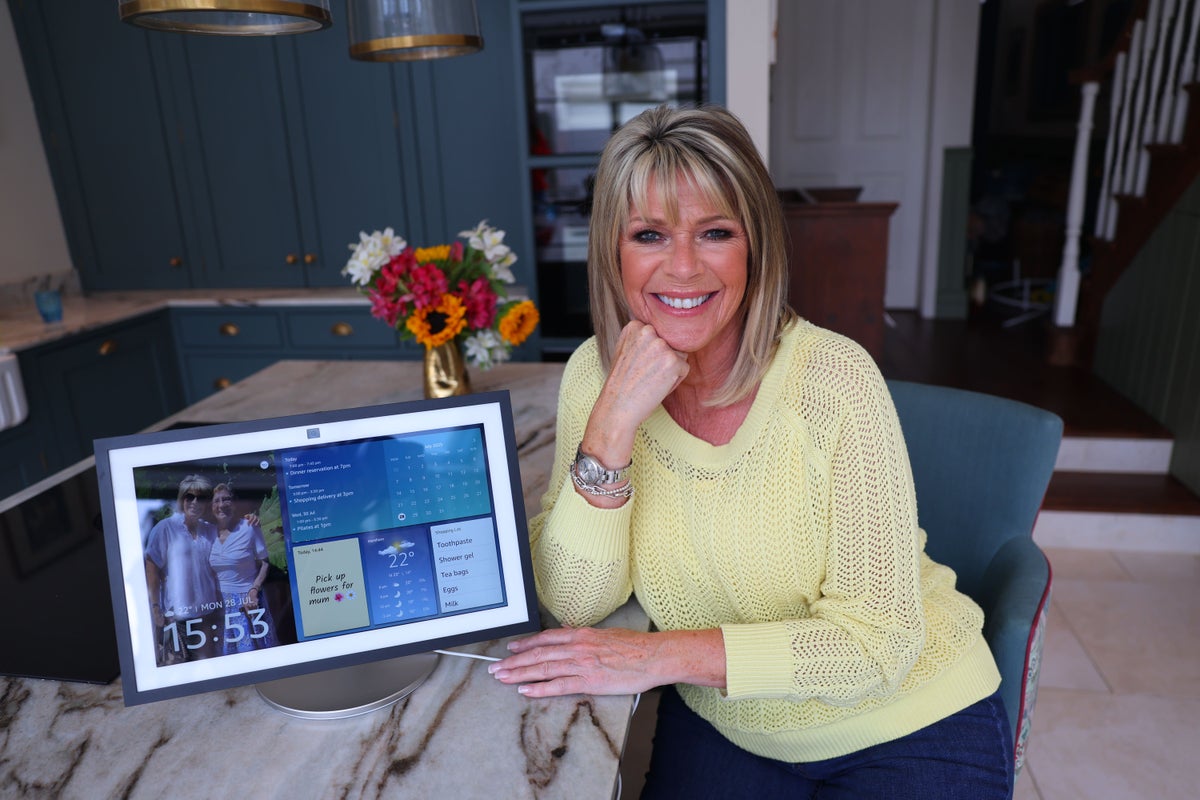Ruth Langsford on caring for her mum with Alzheimer’s

It’s been a tough few years for Ruth Langsford, but the TV presenter isn’t complaining about it.
She split from her husband Eamonn Holmes in May last year after 14 years of marriage, her sister Julia tragically took her own life in 2019 at the age of 62, and her 94-year-old mum is living with Alzheimer’s, 13 years after Langsford’s dad died from the same disease.
But the Loose Women presenter doesn’t want to dwell on what’s happened in the past, and instead intends to focus on caring for her mum Joan, who lives in a care home round the corner from Langsford’s house in Surrey, and enjoying her busy working life.
Talking about her mum, Langsford says: “She wouldn’t remember what she’s had for her lunch or breakfast, and if I go and see her, when I leave, if you said to her was Ruth here today, she’d say no. But in the moment, she still knows it’s me – as soon as she sees me, she says ‘Oh, what a lovely surprise!’ like she hasn’t seen me for months.
“It’s very difficult, but I’m much more well-versed in this with my mum, because of my dad. We as a family had no idea about Alzheimer’s or dementia when he got it, and we were a bit lost. I learned a lot of lessons with my dad.”
Langsford’s mum looked after her dad for about 11 years at home in Cornwall before they were eventually moved nearer to Langsford, and she recalls: “It was a struggle for her towards the end – he would get up in the middle of the night and he flushed his pyjamas down the loo once and flooded the bathroom. It was awful. And she wouldn’t tell my sister and I sometimes, because we lived a long way away.
“But eventually we realised how bad it had got, and she eventually agreed that he should go into a home.”
Langsford stresses that because her mum is now in a care home too, she’s not looking after her 24/7, and explains: “I don’t have that day-to-day care of cooking, cleaning, all those things, but I am still her main carer. So if they say your mum needs to see the doctor, or the dentist, or she needs some shower gel and toothpaste, then that does come down to me.
“And just generally I go in, I take her fruit, I take her flowers, I check the room, I look at her wardrobe, make sure things are hung in the right place. It’s care with love, isn’t it?”
And it’s her caring responsibility that has prompted Langsford to support a new collaboration between the charity Dementia Carers Count and Amazon to help unpaid carers get the most out of Alexa-enabled devices.
They’ve developed a free visual guide that highlights key Alexa features, such advanced scheduling tools to help carers manage daily routines and feel more supported, after research by Dementia Carers Count found 71% of unpaid carers lack adequate support, with over a third (36%) describing their role as a 24/7 responsibility.
“The thing that stood out to me is the reminders, because I’m very good at putting things in the diary like Mum’s dental appointment, and forgetting to check it,” she admits.
“So the fact that you can have a visual and an audio reminder is a great function for me,” she says, before wryly adding: “Actually, using the words ‘remembering to do it’ is kind of ironic, isn’t it, when we’re talking about dementia?”
Langsford, who has a 23-year-old son, Jack, with Holmes, stresses how difficult life can be for unpaid carers, and points out they need all the support they can get. “So many people I know, including myself – I think they call us the sandwich generation don’t they – have got possibly a full-time job, kids still at home, and often parents that need some help, and it’s a lot for people to manage.
“Responsibility like that can weigh very heavily on people, and even though it’s somebody that you really love and you want to take care of them, it’s difficult and you feel responsible, especially if it’s people doing it on their own – it can be very lonely being a carer. And some of them are doing this 24/7 on their own, which I think is very, very difficult. And they need all the support they can get.”
Having both parents with Alzheimer’s, Langsford admits that whenever she forgets something there’s a moment of panic when she wonders if she’s starting with the disease too. But she doesn’t intend to get tested to see if she’s at risk of developing dementia, and explains: “Every time I forget something, those blank moments where you go ‘I’ve totally forgotten that person’s name, and I work with them every day’, I can feel that panic.
“And sometimes I look back and think, I was tired that day, but when you’ve had both parents with dementia of course it’s on my mind, and I know there are tests you can do that can say if you’re more susceptible, but I actually don’t want to know.
“That might sound a bit childlike, but as there’s no cure for it, and I know what it involves, I don’t want to know. I just want to live my life. If I get it, I get it. I hope not.”
So instead of worrying whether she’s going to get dementia, Langsford is living life to the full – really enjoying her work and keeping very busy. “You won’t come around here on an afternoon and find me lying on the sofa watching a film,” she says, “because I’m always pottering about, I’ve got things to do.”
She enjoys putting music on and cooking, gardening, walking her dog Maggie and switching her phone off. “I just try and walk with no earphones in, just walking, breathing in the fresh air, walking my dog in nature,” she says.
“And honestly, I love my work. I’m very lucky. Of course, there are days when I wish I didn’t have to go in because I’m tired or whatever, but I never dread going to work. I love my job, and I’m very fortunate.”
But as she’s now 65, doesn’t she fancy taking things a little easier?
“No – I’ve got a lot on at the moment, and I thoroughly enjoy it,” she insists. “I feel fit, and I’ve started doing Pilates again, which I’m really enjoying. As I get older I’ve started thinking I’ve got to keep supple and keep my joints moving, but I have no intention of slowing down or retiring.”
Ruth Langsford has teamed up with Amazon to demonstrate how she incorporates Alexa into her caregiving routine, using the technology to ease her day-to-day responsibilities.
[title_words_as_hashtags




